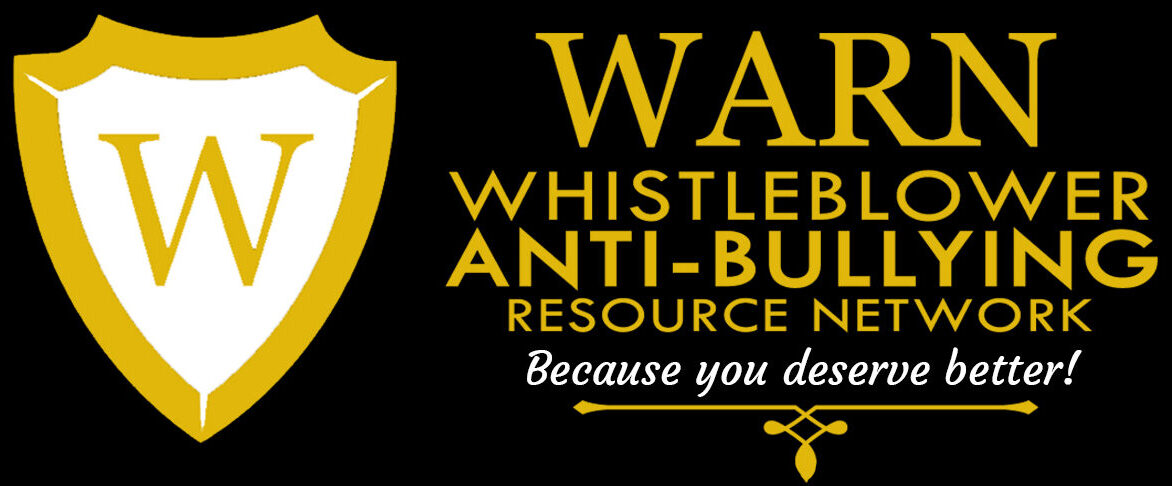How To Land An Online Job from the ASK A HIRING MANAGER series with yours truly! My thanks for the collaboration with Virtual Vocations and for their choice to interview me on this important topic! This below article highlights the essential steps to landing a job – from the cover letter to the interview and everything in between. Take a look and visit Virtual Vocations’ website for job search help – WEBSITE.
Interview Preface:
After a wild 2020, the Virtual Vocations Ask a Hiring Manager series is back with some insight on how to land an online job from one of our Employer Partners. This January, we sit down with Shenandoah Titus, Esq., CEO of the Whistleblower Anti-Bullying Resource Network (WARN). Based in Charlottesville, Virginia, WARN is a legal organization dedicated to the elimination of harassment and bullying in the workplace, as well as protection for whistleblowers.
Through his impressive experience as a Senior Policy Advisor for the Transportation Security Administration and his position as first-ever Program Manager for the Department of Homeland Security Headquarters Anti-Harassment Unit, Titus sheds light on what makes a great candidate for a position at his company and beyond. By following his tips, remote job-seekers can find a way to excel in every aspect of the interview process from the initial application to the interview, and hopefully, land an online job.
Note from Mr. Titus: First, as an attorney, I offer this disclaimer. Nothing that I communicate herein is to be construed as rendering legal advice or counsel.

“I’m a very decisive person, yet my approach to decision making isn’t what one might call “scientific.” Assuming that the basic qualifications are met, I go with my instincts about a particular candidate. I always trust my instincts. Do my instincts tell me that this person will contribute the most to WARN, in helping us eradicate workplace abuse nationwide? If the answer is affirmative, then that person will be welcomed aboard the most dynamic whistleblower and anti-bullying team in the world!”
Is a Resume Important When You Are Making Hiring Decisions?
Yes. The resume provides a snapshot of the candidate’s professional background and qualifications for the position. However, what is even more important is the candidate’s ability to provide a well-written, typo-free resume with proper grammar. Resumes that are poorly written give a negative first impression and suggest that the candidate will do sloppy work if hired. Therefore, I do not consider poorly written resumes at all.
What Things Will Turn You off From Inviting a Candidate to an Interview?
As aforementioned, a poorly written resume will disqualify the candidate on the spot. Also, if the candidate inflates his/her credentials beyond reason–thus having the appearance of being untruthful, the candidate will not be invited for an interview.
For example, a candidate completes a professional development seminar at Harvard. However, the candidate’s resume states that she/he “graduated” from a program at Harvard. That would be too much embellishment, and I would find the candidate disingenuous, to say the least.
What Three Things Are Most Important During an Interview?
- Punctuality. My philosophy is that if I’m not early for an interview (10–15 minutes), then I’m late.
- Preparation. Do your research about the organization prior to the interview. You do not want to have a blank stare when asked the ubiquitous question: “So, what do you know about us?” And be prepared for what you think might be their toughest questions. Anticipate challenging questions and imagine giving brilliant answers.
- People skills. You are not being interviewed by robots (at least not yet). Thus, be interesting, thoughtful, attentive, and engaging.
What Should a Potential Candidate Know About Interviewing to Land an Online Job?
Know that the job interview is a gift to you. Don’t take it for granted. It’s your opportunity to shine!
How Important Is Having All of the Requirements in the Job Listing? Should I Still Apply Even if I Only Have 50% or 75% of the Requirements?
It is absolutely important to at least meet the educational or licensure requirements of the position. For instance, if a job announcement requires a law license, then there’s no fudging that fact. Either you possess a law license or you don’t.
Wasting the employer’s time when one does not even meet the threshold educational or professional licensure requirements may actually preclude other opportunities down the road with that company. It leaves a negative first impression. Other than required educational and licensure credentials, I do not think that job requirements are quantifiable. If one passionately wants the position, and one feels that he/she can ethically make the case that she/he can do the work competently, then it behooves one to just go for it. Yet come prepared to truthfully answer the question: “What makes you the best-qualified candidate for this position?”
What Are You Looking for in Candidates in Terms of Culture Fit With Your Organization?
As the CEO, I strive to create within WARN a culture of respect, support, courtesy, and commitment to our mission. Candidates need to give me the sense that they share those cultural values.
What Are You Looking for in a Cover Letter That You Can’t Get From My Resume?
I address that issue upfront in my job announcements. I advise applicants to convey something to me in their cover letter that is not merely a summary of their resume. When I look at a cover letter or statement of interest, I’m not searching for the candidate’s credentials. Rather, the cover letter is the candidate’s opportunity to display her/his passion for the job and commitment to the mission.
To use lawyer-speak, this is your opportunity to provide your “opening” and “closing statement” to the “jury” (the prospective employer). Use the opportunity well!
They Say That Job Applicants Only Have a Matter of Seconds to Make an Impression With a Cover Letter. What Are Three Things on Cover Letters That Will Cause You to Immediately Reject an Application?
- Typos. Demonstrates sloppiness.
- Too lengthy (more than one page). Indicates an inability to be concise and precise.
- Generic and impersonal opening, e.g., “To whom it may concern,” as opposed to addressing the cover letter directly to me or to my organization. Addressing the cover letter generically suggests that it’s a cut and paste letter to several employers in hopes that something will land. It’s fine to apply across the board, but just don’t be too obvious about it.
When It Comes Down to It, How Do You Decide Who Gets the Job Offer?
I’m a very decisive person, yet my approach to decision making isn’t what one might call “scientific.” Assuming that the basic qualifications are met, I go with my instincts about a particular candidate. I always trust my instincts. Do my instincts tell me that this person will contribute the most to WARN, in helping us eradicate workplace abuse nationwide? If the answer is affirmative, then that person will be welcomed aboard the most dynamic whistleblower and anti-bullying team in the world!
Take It From Titus: How To Land an Online Job
As Titus remarks, one of the most important aspects of landing an online job starts before you even apply and continues throughout the hiring process. By researching the company, ensuring your cover letter and resume are free from typos, and being true to yourself and the company, you can raise your stock and boost your chances for a rewarding career in the legal field or your particular industry.

